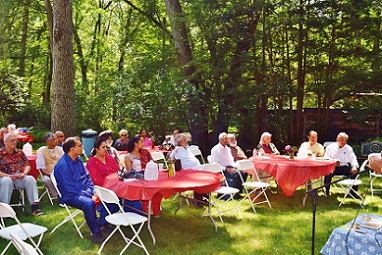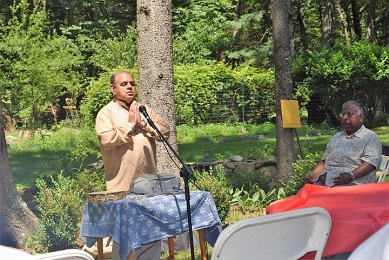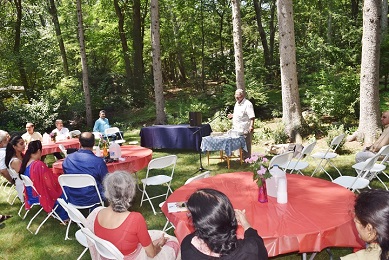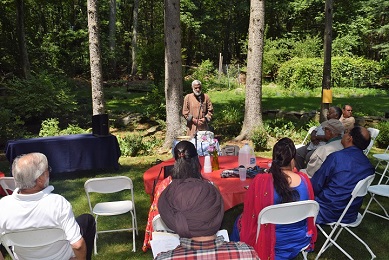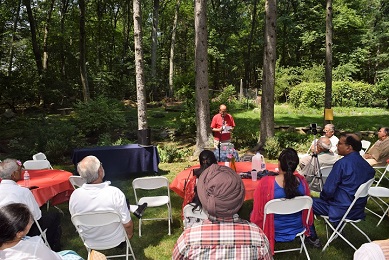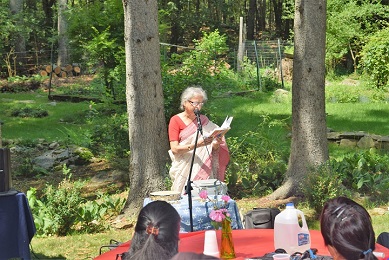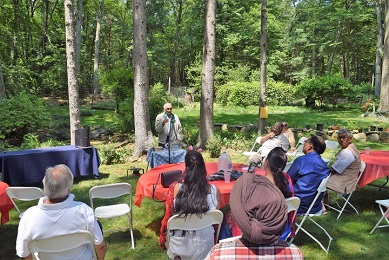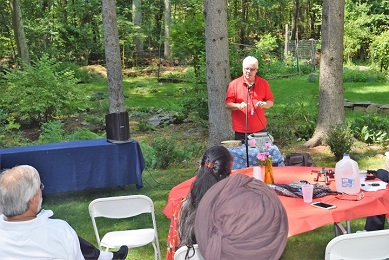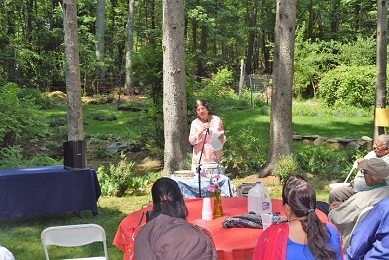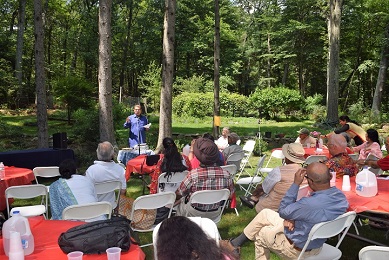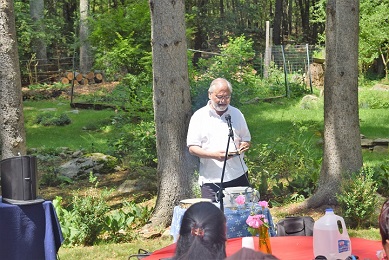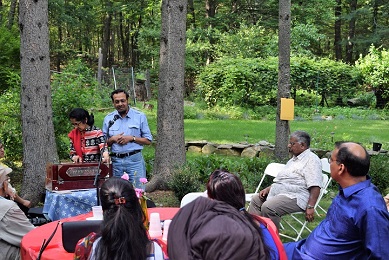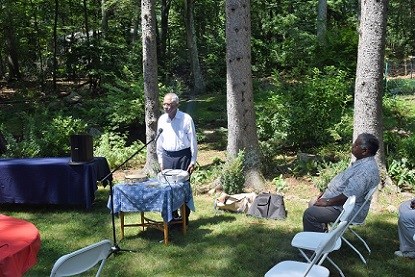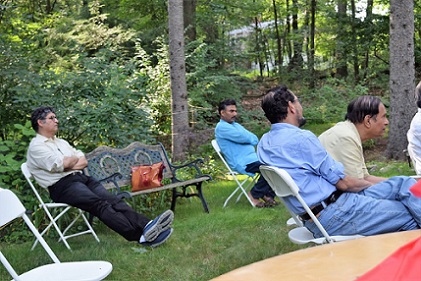Contribute
| Indian Folk Literature In A Garden - SAPNE Picnic 2017 |
Soumya Chotneeru
09/07/2017
On a sunny picturesque August day, the SAPNE poets assembled in a
shady garden in Lincoln, MA, to host the first event dedicated to folk
literature of South Asia. The date was Sunday,
August 6, 2017. The summer songs of birds, the warm rays of sunshine, and the
greenery of tall trees and gardens of flowers created the setting of the story
telling that is celebrated through the folk literature. This wasn't a typical
poetry event where poets recite or perform their favorite pieces with musical
intonations. But in between each piece, there were discussions of life
experiences, lessons learned, talks of the beauty and struggles of our culture.
It was a special event. I was awe inspired to hear from these people who had so
much life within. I learned much more about India than any textbook could teach
me. The program began at 1 PM with light refreshments. Bijoy Misra made
the introductory remarks to help define the work “folk†in Indian languages
through its etymology. It can be
described as something we share from our experience and we pass on to the
future generation through stories and oral literature. Subhash Sehgal recited the Vedas, the
scriptures of the Hindus, and Mir Fazal recited from the Quran, the
scripture of the Islamic faith. They
were followed by Vimal Jain who recited excerpts from the Samansutta, the scripture of the Jaina religion, and Sarbjit
Singh recited from the Granthsahib, the scripture of the Sikh
religion. Sanjeev Tripathi offered
welcome to all participants and the guests to the event on behalf of SAPNE. About forty people attended. Segment I The veteran Punjabi poet Jaspal Singh opened the program with a
soul-touching rendering from the famed poet Waris Shah. The poem of Heer celebrated the love story
popular in Punjab. Moolraj Mathur, the nonagenarian social activist, followed
with a short talk on the ideals of living life.
Life is based on the principles of sacrifice. Balachandra,
the Kannada poet, followed with a piece composed specially for the
occasion. Life is a blend of activities
and harmony. Alok De, the Bengali poet, reflected the inertial insecurity of human
attitude. Time passes, the humans continue
to build walls. Prem Nagar recanted his youth and reflected on
the origin of melody in a human being. A
melody is the manifestation of love. Srilkashmi Srinivasan, the Tamil vocalist,
sang the harvest folk song " Soi soi" from the recent Tamil movie
Kumki. Neena Wahi followed with the Dohas
of Kabeer, and recited a poem entitled “Garmi Ka Mausam†in Hindi. Maya De recited two poems of Sukumar Roy, the famous Bengali folk
poet. “Shabdakalpadroom†celebrated word
and sound, and “Satpatroâ€, a satire on the wishful efforts in finding a bridegroom! Preetpal Singh followed with the Punjabi poem
“Dal makhniâ€, a satire on ornamenting the leftover food with extra butter! Following the village theme, Madhu Annad
sweetly rendered the meditative blessing "Sab Mangal Ho" in
Hindi. Dale Riley, a musician and a past
employee of Harvard University spoke a few words about the literature
activities at the University and his efforts in composing music with South
Asian cultural accent. The presence of
Thomas Burke from Harvard University was acknowledged. Lunch The group broke for lunch. It
was pot-luck, dishes contributed by the SAPNE volunteers. Sanjeev Tripathi and wife Archana Tripathi
were the principal organizers with support from Hardeep Mann, Preetpal Singh,
Neena Wahi, Jayashree Kanna, Srilakshmi Srinivasan, Bijoy Misra, Muneebur
Rahman, Ravi Teja, Maya De, Swapna Ray, Jayant Dave and Sarbjit Singh. Eating delicious rotis, channa, dals, palak
curries, dahi bada, utapa, sweets and ice cream, all while watching one poetic
piece after another, let me feel like I traveled back in time to ancient India
every time I closed my eyes while there. Segment II Ravi Teja read a couple of slokas from the Sundarakanda of Valmiki
Ramayana that celebrated the Moon in the night.
He also did the animated rendering of lines of Lakshmana in Aranyakanda
from a previous Sanskrit play. Subhash
Sehgal followed to express his appreciation of people, festivals and music. He observed that the melody is a natural
exuberance of happiness and peace. Madhu
Anand reciprocated with the rendering of “O Dekho Barkha Ki Aayi Bahaar" a
folk song written and composed by the famous Hindi poet Late Shri Girija Kumar
Mathur. Rahul Ray and Swapna Ray added sweet touch with harmonium and drums in
singing a couple of Bengali folk songs. Sanjeev Tripathi recited the twelfth
century folklore “Alha Khand†written by poet Jagnik. The poem popular in Madhya Pradesh celebrated
the bravery of soldiers in the battle field. Bijoy Misra put to music the lyric in Oriya of
his translated text from Nasadiya sukta of the Vedas. He used the simple stick instrument called
“dasakathiaâ€, an old folk instrument from Orissa. Is God True, Untrue, or is it Nothing? Sarbjit Singh had an emotional expression of his life’s heroic
story. He faced life in depression and
anxiety, but survived through friendship.
His was a story of celebration. Mir
Fazlul Karim narrated his life from Pakistan via Bangladesh to the US. He recited a short poem in Bengali. The flow of life is like a river touching love
and affection in many regions. Vimal
Jain, the veteran Jain academic, recited his poem that analyzed truth and its
many facets. Though not clear in its
appearance, there is truth in all different views. Pramit Singh recited “Lahara kar Bole Shivashankar†the descent of
Ganga to the earth with the prayers of King Bhagirath. The second poem “Maa†analyzed mother's care
and affection for her child. The third poem “Prayas kar e Manav†championed
hopefulness through our efforts for the best.
Alok De followed up with another Bengali folk song leading to the riddle
poet of Bangladesh Nasim Baiduzzaman.
The woman in the far window is only an image, she is visible but
unreachable. A search is always a
mystery. Finally, Muneebur Rahman recited a few Kashmiri couplets on village
and life. In closing, Preeti Nagar and Prem Nagar rendered the first stanza of
the Hiranyagarbha Sukta of the Vedas. Composed and musically arranged by
Preeti Nagar, it is a SAPNE original production. Sanjeev Tripathi thanked all for participation
and beautiful music. The program ended
at 5 PM. It was truly one of the best
events I have ever attended. The meeting flyer was created by Janmejay Shishupal and pictures are
the courtesy of Sanjeev Tripathi. SAPNE – South Asian Poets of New England SAPNE, the South Asian Poets of New England completed ten years this
summer. Currently, the events are
organized by India Discovery Center, the local nonprofit group working for the
cultural awareness and education in the community. The Fall SAPNE event is on Sunday, November
12, at 2 PM, at Lincoln Public Library, Lincoln, MA. The theme for the afternoon would be “Voice
of the Peopleâ€. Poets are requested to
select special literary poems in different languages and try to translate them
into English in recitation. Original poems are always welcome. Please contact Sanjeev Tripathi sanjeevkt@hotmail.com or Chandu Shah
chandu420@gmail.com for participation.
More information on SAPNE can be found at http://southasiapoets.wixsite.com/sapne
You may also access this article through our web-site http://www.lokvani.com/
